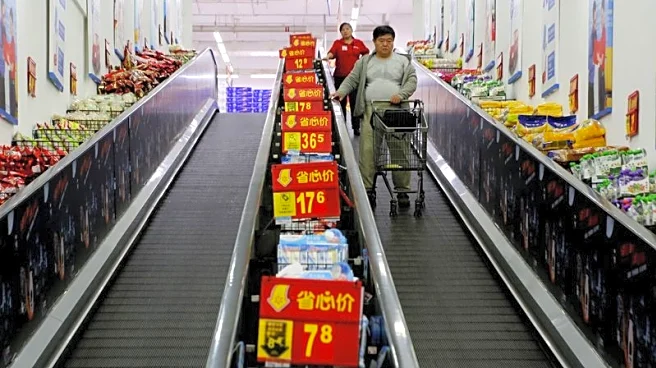BEIJING (Reuters) -Deflationary pressures persisted in China, with both consumer and producer prices falling in September, official data showed on Wednesday, as a prolonged property market downturn and trade
tensions weighed on consumer and business confidence.
China's export growth bounced back in September, but renewed trade measures and threats from Beijing and Washington have rekindled concerns about jobs and further deflation.
Producer prices (PPI) in September fell 2.3% from a year earlier, narrowing from a 2.9% fall in August, National Bureau of Statistics (NBS) data showed. It marked the smallest decline in seven months, partly due to extensive government efforts to curb price competition and was in line with expectations.
The consumer price index (CPI) dipped 0.3% last month from a year earlier, less than a 0.4% fall in August and compared with a 0.2% fall in a Reuters poll of economists.
"We continue to expect both CPI and PPI to stay in deflation this year and next," said Zichun Huang, China economist at Capital Economics.
"Policymakers are now taking deflation more seriously. But we doubt that supply-side solutions they are proposing will succeed without substantial demand-side support," she said.
On a monthly basis, CPI was up 0.1%, versus no change in August, and below a forecast 0.2% increase.
Core inflation, which excludes volatile food and fuel prices, was 1% in September from a year earlier, accelerating from 0.9% in August and hitting a 19-month high.
The combination of the Mid-Autumn festival and the National Day holiday failed to arrest a downtrend in holidaymakers' average spending, as cautious consumers were wary of discretionary expenses amid a weak job market and continued property sector downturn.
Policymakers appear in no rush to announce major stimulus as they would risk fuelling a stock market rally with pro-growth measures.
Food prices fell 4.4% year-on-year, compared with a 4.3% drop in August.
Factory-gate prices have fallen since October 2022 but declines have lessened in recent months due to the government's calls for key sectors to scale back cut-throat competition. A prolonged price war in the auto sector, for instance, has taken a toll on major automakers' bottom lines.
While the government's campaign to fight against price competition in key industries helps manufacturers, a fresh tit-for-tat showdown between the world's two largest economies dampens hopes for a sustained trade deal.
(Reporting by Zhang Yukun, Qiaoyi Li and Ryan Woo; Editing by Jacqueline Wong)









